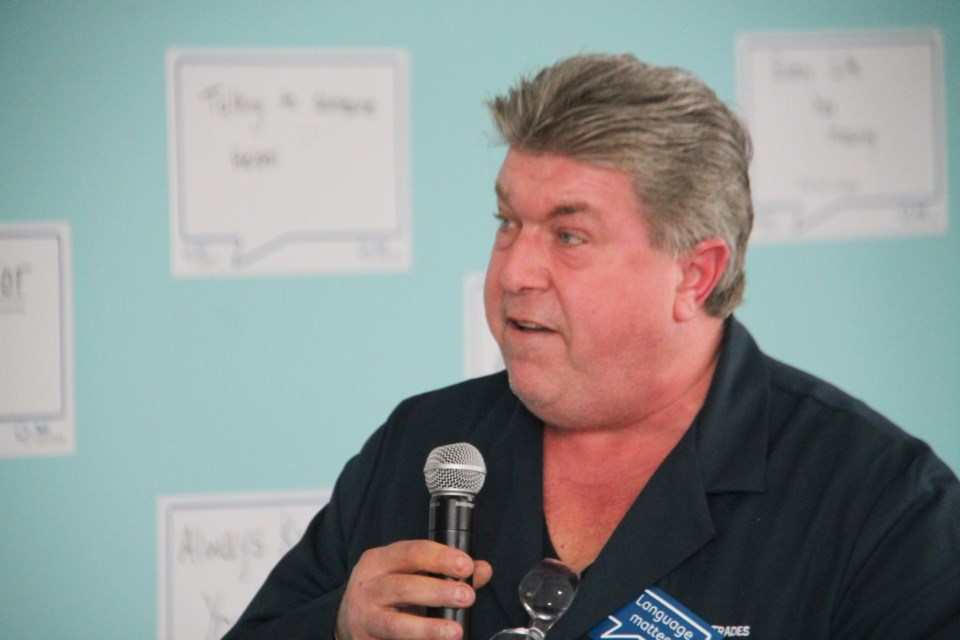Wednesday marked Bell Let’s Talk Day, dedicated to helping reduce the stigma surrounding mental health issues and getting those who suffer from them to open up.
It also marked the 7th annual Bell Let’s Talk collaboration between Sault College and the Canadian Mental Health Association (CMHA) Sault Ste. Marie Branch.
Emceed by Lisa Carricato, CMHA Sault Ste. Marie Branch mental health educator, the event (held at the college) emphasized the importance of seeking professional help for anxiety, depression and other mental health issues before they potentially lead to deep despair and addictions.
“It’s so imperative (to open up and talk),” said Peter Corbett, a Sault College machine shop professor, one of several speakers at the Bell Let’s Talk gathering, a community event which included CMHA professionals and Sault College students, staff and faculty.
As a young man, Corbett suffered grief from the loss of his father as well as physical injury and surgery resulting from a 24-foot fall.
“By 21, I had seen a lot of stuff so far in life,” Corbett told Wednesday’s Bell Let’s Talk audience.
As time went by, Corbett married, he and his wife welcoming a son into the world, but the infant boy died from leukemia at two and a half months old.
Corbett told the audience the despair he felt over his son’s death drove him to alcohol.
“I’m not scared to talk about it.”
“There’s two roads you can take. I let the alcohol try to cure me. It didn’t work.”
Eventually, Corbett sought help for his alcohol addiction, and is now the father of two daughters.
“It (professional help) allowed me to have new tools in my tool box that I could use going forward, and I used them."
“I chose to get up and speak today and share this with my students, to say you never know what shoes somebody has walked in,” Corbett said, adding he has helped others take steps to quit drinking and others who have lost children.
“Because I’m a big guy, you automatically assume I’m a tough guy. I’m not. Where I went wrong was I played the tough guy when my son died. I didn’t give myself the opportunity to grieve. I wanted to make sure my wife was okay, but I wanted to play the tough guy and it caught up with me.”
“It’s like a roller coaster. You need to get on it (when hardship comes), you need to ride it. Some hills you’re going to cry, on other hills you’re going to get mad, other hills you’re going to be confused. These are all normal emotions you’re going to go through and you need to go through them (and seek help instead of trying to seek comfort through substance abuse).”
Corbett said he urges his students to seek out counselling services at the college if they feel the need to do so.
“There’s always somebody there to help you put stuff in your tool box, so as you move forward in life you always have something in there to work with. If you need tools there’s somebody there that has them, that can provide them for you.”
“I went the wrong way. It was terrible. I had stacks of empty bottles,” Corbett said, speaking to SooToday.
“By the time everything had happened, I was only 27 years old and I thought ‘how much can a man take?’”
“But, I was able to get some tools (mental health and addictions counselling) to help me deal with it.”
“Talk to somebody. Don’t hold it in. Don’t keep it in because it will eat at you. And when it comes out, it’s not nice. Keep moving forward,” Corbett said.
“We often talk about how important mental health is and how we want to encourage others to talk about their mental health, but we need to keep in mind we also need to talk about our own mental health,” said Jonathan Nolan, Sault College Indigenous student recruiter and success officer.
“If we can take care of ourselves, we can then help others.”
“Being a male, I would encourage other men to speak up as well. We have feelings, we have heartbreaks, we’ve had experiences in our lives, and it’s okay to share our feelings too. It encourages other males to share when they see another man sharing too,” Nolan said.
Like Corbett, Nolan encouraged Sault College students to seek out the school’s counselling team if they feel the need.
Other speakers included Amanda Lambert, who said she has battled her way back from an eating disorder, and Shelby Speck, who shared her story of recovery from drug addiction.
“When you ask for help you’re actually showing strength, not weakness. Please note recovery is possible, no matter how hopeless you might feel,” Lambert said.
Officers from several Sault and area law enforcement agencies were also on hand, reinforcing the importance of opening up and speaking of the benefits of peer support programs police now have in place.
The Mental Health Commission of Canada states one in five people in Canada will experience a mental health issue or illness in any given year.
In Canada and around the world, for the past nine years, people have joined in what is called the world’s largest conversation around mental health on Bell Let’s Talk Day to reduce the stigma around mental health issues.
